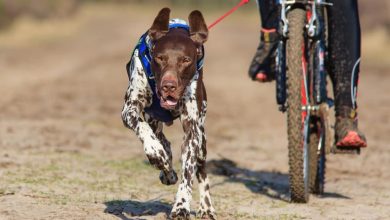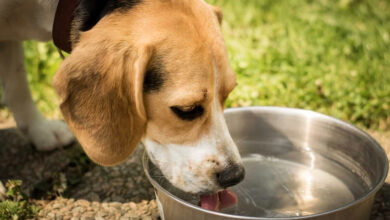What To Do When Your Dog Is Shaking And Drooling

1. Introduction:
Shaking and drooling in dogs can be a sign of something serious, or it may just indicate that your pup is feeling anxious or stressed out. It’s important to watch for other signs that could indicate health problems, such as fever, vomiting, diarrhea, lethargy, or loss of appetite. In this article, we’ll discuss what to do when your dog is shaking and drooling so you can help your pup feel better quickly!
2. Causes of Shaking and Drooling:
Shaking and drooling in dogs can have many different causes, ranging from anxiety or stress to more serious medical conditions like seizures or poisoning. Some common causes include fear or excitement, pain or discomfort due to an injury or illness, allergies, heatstroke, poisoning, hypoglycemia (low blood sugar), distemper virus infection, rabies virus infection, epilepsy/seizures, nausea/stomach upset due to ingested foreign objects or food intolerance/allergy reactions. In some cases there may not be an obvious cause for the shaking and drooling – if this is the case then it’s best to seek veterinary advice as soon as possible as there could be an underlying medical condition present that needs treatment.
3. Symptoms of Shaking and Drooling:
The most obvious symptom of shaking and drooling in dogs is excessive saliva production (drool) accompanied by trembling or shivering (shaking). Other symptoms that may be present include panting, restlessness, pacing back and forth, whining or barking excessively, hiding away from people or other animals in the home, loss of appetite and general lethargy.
4. Diagnosing the Problem:
If your dog is showing signs of shaking and drooling it’s important to take them to the vet as soon as possible so they can diagnose the problem and provide appropriate treatment. The vet will likely perform a physical examination of your pup as well as run tests which may include blood work, urine analysis and imaging such as x-rays or ultrasounds. This will help them determine the underlying cause of the shaking and drooling so they can provide appropriate treatment.
5. Treatments for Shaking and Drooling:
The treatment for shaking and drooling in dogs will depend on the underlying cause identified by the vet. For example if the cause is an infection then antibiotics may be prescribed; if it’s an allergy then antihistamines may be recommended; if it’s caused by a toxin then supportive care such as IV fluids may be needed; if it’s due to a seizure disorder then anticonvulsant medication may be prescribed; if it’s due to anxiety then behavior modification techniques may be recommended; etc.
6. Home Remedies for Shaking and Drooling:
If your pup is showing mild signs of shaking and drooling there are some home remedies you can try before taking them to the vet. These include providing a quiet environment with minimal distractions; engaging in calming activities such as going for a walk; providing plenty of exercise; giving them treats containing calming ingredients such as chamomile or valerian root; playing soothing music; using pheromone sprays around their bedding area; providing chew toys that encourage mental stimulation; providing plenty of praise when they are calm; etc.
7. Prevention of Shaking and Drooling:
To prevent your pup from experiencing episodes of shaking and drooling it’s important to keep up with regular veterinary checkups so any underlying health issues can be identified early on before they become more serious. Additionally you should ensure that your pup is getting enough exercise each day as this will help keep them physically fit which can reduce their stress levels. Finally you should provide plenty of mental stimulation through interactive toys and activities so they don’t become bored which can lead to anxiety-related issues such as shaking and drooling.
8. When to Seek Veterinary Treatment:
It’s always best to seek veterinary advice when your pup is showing signs of shaking and drooling so they can diagnose the problem correctly and provide appropriate treatment if needed. If your pup has been exhibiting these symptoms for more than 24 hours then you should take them in for an exam right away as this could indicate a more serious underlying condition such as poisoning or a seizure disorder that needs immediate attention from a professional veterinarian. Additionally if you notice any other symptoms such as fever, vomiting, diarrhea, lethargy or loss of appetite then you should also seek veterinary advice right away since these could indicate a more serious health issue that needs prompt medical attention from a qualified veterinarian.
9. Common Questions About Shaking and Drooling:
Q: Is my dog in pain when he shakes?
A: While shaking can sometimes indicate pain in dogs it isn’t always the case – sometimes dogs shake due to excitement or anxiety rather than pain so it’s important to watch for other signs such as panting heavily or whining/barking excessively that could indicate pain before assuming this is the cause behind their shaking episode(s).
Q: Is my dog’s shaking normal?
A: It depends – while some dogs shake due to excitement or anxiety which isn’t necessarily abnormal it’s important to watch out for excessive episodes that could indicate something more serious such as seizures or poisoning which require immediate medical attention from a qualified veterinarian.
Q: What should I do if my dog won’t stop shaking?
A: If your pup won’t stop shaking then you should take them into see a vet right away since this could indicate something more serious than just anxiety/stress related issues – for example seizures need immediate medical attention from a qualified veterinarian since they can cause further damage if left untreated for too long so don’t delay seeking veterinary advice if needed!
10. Final Thoughts on What To Do When Your Dog Is Shaking And Drooling:
Shaking and drooling in dogs can have many different causes ranging from anxiety/stress related issues all the way up to more serious medical conditions like seizures/epilepsy or poisoning – therefore it’s important not to ignore these symptoms but instead take your pup into see a qualified veterinarian right away if needed so they can diagnose the problem correctly and provide appropriate treatment! Additionally there are several home remedies you can try before seeking professional help such as providing calming activities like going for walks together or playing soothing music around their bedding area – however always make sure you watch out for other signs that could indicate something more serious than just anxiety/stress related issues which require immediate medical attention from a qualified veterinarian!
11 Conclusion:
Shaking and drooling in dogs can have many different causes ranging from simple anxiety/stress related issues all the way up to more serious medical conditions like seizures/epilepsy or poisoning – therefore it’s important not to ignore these symptoms but instead take your pup into see a qualified veterinarian right away if needed so they can diagnose the problem correctly and provide appropriate treatment! Additionally there are several home remedies you can try before seeking professional help such as providing calming activities like going for walks together or playing soothing music around their bedding area – however always make sure you watch out for other signs that could indicate something more serious than just anxiety/stress related issues which require immediate medical attention from a qualified veterinarian!



